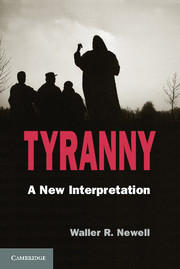Book contents
- Frontmatter
- Contents
- Acknowledgments
- Introduction
- 1 Is There an Ontology of Tyranny?
- 2 The Tyrant and the Statesman in Plato's Political Philosophy and Machiavelli's Rejoinder
- 3 Superlative Virtue, Monarchy, and Political Community in Aristotle's Politics
- 4 Tyranny and the Science of Ruling in Xenophon's Political Thought
- 5 Machiavelli, Xenophon, and Xenophon's Cyrus
- 6 Glory and Reputation
- 7 The Republic in Motion
- Conclusion
- Epilogue
- Bibliography
- Index
4 - Tyranny and the Science of Ruling in Xenophon's Political Thought
Published online by Cambridge University Press: 05 May 2013
- Frontmatter
- Contents
- Acknowledgments
- Introduction
- 1 Is There an Ontology of Tyranny?
- 2 The Tyrant and the Statesman in Plato's Political Philosophy and Machiavelli's Rejoinder
- 3 Superlative Virtue, Monarchy, and Political Community in Aristotle's Politics
- 4 Tyranny and the Science of Ruling in Xenophon's Political Thought
- 5 Machiavelli, Xenophon, and Xenophon's Cyrus
- 6 Glory and Reputation
- 7 The Republic in Motion
- Conclusion
- Epilogue
- Bibliography
- Index
Summary
Before properly entering into the complex relationship between Machiavelli's modernism and a certain dimension of Christianity limned in previous chapters, we need to complete our examination of his relationship to the classical tradition in its own right by turning to the one classical thinker and Socratic who perhaps comes closest to anticipating the modern project launched by Machiavelli. This chapter examines Xenophon's lengthy and explicit exploration of the possibility that the best regime might be that of a monarch possessing what Aristotle terms “superlative virtue,” undertaken through his pseudo-history of Cyrus the Great. Whereas, as we have seen in the previous chapters, this monarchical claim is muted by Plato and Aristotle for the sake of the political community, Xenophon goes much further than either of them in jettisoning the claims of republican self-government in favor of an open endorsement of rational, benevolent absolutism. Hence, Xenophon's Education of Cyrus can be regarded as his monarchical utopia, a direct riposte (as noted by later Hellenistic, Roman, and Renaissance commentators) to Plato's republican utopia, the Republic. As I argue, the Education of Cyrus is the full elaboration, in the form of a utopian historical narrative, of the prescription for reforming tyranny into “leadership” set forth by Simonides as he is depicted by Xenophon in the Hiero.
Roads to the education of cyrus: The Distinctiveness of Xenophon's Political Thought
It is a commonplace regarding ancient political philosophy that it has no relevance for us today because the Greeks had no experience of large-scale societies and governments like our own. According to this view, because the ancient Greeks lived in small city-states, they idealized this particular kind of government as the best one in principle for all places and times.
- Type
- Chapter
- Information
- TyrannyA New Interpretation, pp. 186 - 227Publisher: Cambridge University PressPrint publication year: 2013

